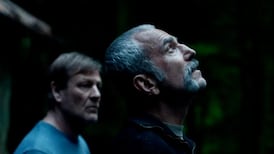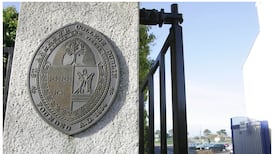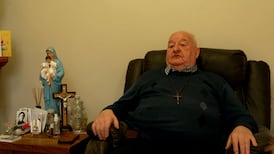Embarking on a year as artist in residence in Limerick, Dónal Lunny tells SIOBHÁN LONGthat the qualities required to teach music are in some ways the reverse of those needed to play it
RECESSION OR NO recession, the appetite among music students for learning tunes and solving musical conundrums is as healthy as it ever was. The truth is that while many concerts and festivals are feeling the brunt of the downturn, traditional music’s calendar is packed with summer schools, festivals, gigs and sessions, none of which require punters to consider remortgaging in order to participate in the same way that their rock/pop counterparts do.
Bouzouki players in particular have struck the jackpot this year, because Dónal Lunny is about to embark on a year-long stint as artist in residence at the University of Limerick’s Irish World Academy of Music and Dance, which will include a week’s tuition during the Blas Summer School.
Lunny’s involvement with Blas began last year, when Micheál Ó Súilleabháin, the academy’s director, invited him to join the stellar cast of tutors, which includes Martin Hayes, Matt Cranitch and Colin Dunne. Incredibly, it was only the second time (the first being at a London festival 12 years ago) that Lunny had been invited to teach music. For a man whose contribution to traditional and contemporary music is unparalleled, through his work with Emmet Spiceland, Planxty, The Bothy Band, Moving Hearts, Coolfin, Mozaik and countless other incarnations, remarkably few people have thought to exploit his teaching talents. Perhaps that’s because he’s always been so busy recording and touring, but it seems that now that he’s got a taste for it, Lunny is warming to the task.
Now living in Okinawa in Japan, he shuttles back and forth between there and Ireland,doing all of his musical work (performing, recording and producing) here and exploiting music technology so that he can continue his production work in Okinawa.
“Last year was a new learning experience for me,” he offers, with characteristic modesty. “That’s the irony of it. I don’t think that I’m a very good teacher, but I am learning. It’s really about translating what I do into terms that people can understand.”
Micheál Ó Súilleabháin, meanwhile, is hugely animated by the prospect of Lunny’s involvement in Blas. “He exuded this sense of fulfilment from the experience himself,” he enthuses, “and we were amazed by that ourselves. Dónal is a very gentlemanly, quiet person, so I think a certain kind of teaching, a certain masterclass, suits him. It’s fabulous for the students, because it brings the real world of professional performance right into the learning environment.”
LUNNY HAS BEEN responsible for embedding the bouzouki, a Greek instrument, in the heart of Irish traditional music. His rich and complex arrangements have provided a compelling rhythmic backbone to the tradition, drawing out the essential pulses and cadences of the music but never at the expense of its melody lines. The chance to get up close and personal with a musician of such skill and grace will lure a raft of Lunny wannabes to the University of Limerick from today, when Blas kicks off in earnest. Lunny admits that much of what he does musically is as much a revelation to him as it is to his students. Describing his first experience of teaching, he laughs at the unexpected complexity of the process, and the demands it placed on him, not to mention his students.
“I started out with something which I thought was fairly simple,” he says, “and suggested that we just accompany a tune. The first five seconds that I played, I spent the rest of the class back-pedalling, unravelling what I had given them. It was then that I realised that I was making all kinds of assumptions by virtue of the fact that I was doing things and not thinking about them.”
Bringing the unconscious into the conscious is almost the reverse of what he had experienced as a developing musician. “I think the objective of achieving fluency on an instrument is to be able to forget what you’re doing, so that what you’re thinking translates into music. In fact, what one needs to do is to get objective about that and describe it in mechanical terms.”
As part of his artist-in-residence commitments, Lunny will be doing a week-long workshop with students of both the MA and BA in Irish Traditional Music Performance courses, working towards a newly commissioned piece, called Blas, to be performed on June 24th at his concert in Limerick's Daghdha Dance Space. "We'll be working with traditional tunes and experimenting with arrangements," he says. "That's the approach I plan to take over a four-day period."
LUNNY’S ADOPTED HOME of Okinawa shares musical commonalities with home. Both Okinawan and Irish traditional music forms have flourished, partly because of their relative isolation, Lunny suggests. “There are definitely parallels,” he says. “Okinawa is an island about 400 miles off the coast of Japan. It has its own language, its own culture, and its music is in a very healthy state. At the same time, the approach to it is quite rigid, by and large, and people learn tunes and songs note for note, using the sanshin . It’s very beautiful but it’s very ‘set’, and there’s a reverence for old arrangements which are carried forward, and every note is kept in place, whereas Irish music is more flexible . . . I think the movement and evolution of Irish music is a very good thing, and should be fostered and encouraged, because that’s the thing that keeps it alive. It’s the paradox of change: some people want to keep things the way they were, and others want to change them, and there’s a tension there – and that’s how it should be.”
Meanwhile, Micheál Ó Súilleabháin is currently overseeing the construction of a new home for the academy on the university campus. It’s a 5,000-square-metre colossus on the banks of the Shannon, which local wags have already christened the ‘Taj Micheál’, much to Ó Suilleabháin’s amusement.
“It’s a €21 million building, which we hope will be finished next February,” Ó Súilleabháin says. “It means that we can put our sonic, gestural and spatial imprint on the space. I think the impact will be poetic as well as practical, but it’s hard to imagine it being anything other than good.”
Blas Summer School runs from today until July 3. Blas concerts include Dónal Lunny and friends at Daghdha Dance Space, Limerick, on Wed, June 24; Tony McManus (guitar) at Dolan’s, Limerick, on Tue, June 30: and Martin Hayes and Dennis Cahill at St Mary’s Cathedral Limerick, on Thur, July 2. www.blas.ie










